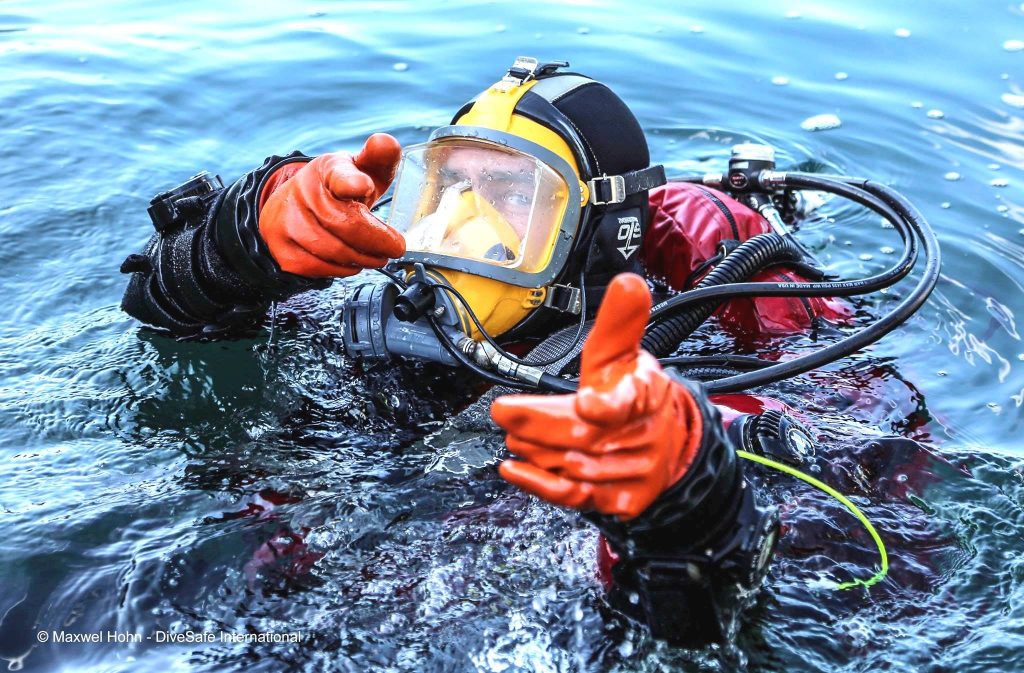
Saltwater cowboys
June 19, 2018
By Kelly N. Korol
As important as having the specialized skillset, an aquaculture diver should also have the temperament to get the job done, writes Kelly N. Korol.
 DiveSafe International student Rob Field. Divers are puzzle and problem solvers and enjoy the challenge of finding solutions for the underwater portion of the farm system
DiveSafe International student Rob Field. Divers are puzzle and problem solvers and enjoy the challenge of finding solutions for the underwater portion of the farm system Arguably, one of the most challenging but rewarding jobs on the farm site is the aquaculture diver. Very much like the cowboys on the cattle ranch, the divers are responsible to rig the underwater system, mend the nets, deal with the predators and do their best to ensure the stock is healthy and makes it to market. Just like their cowboy counterparts, the aquaculture diver has a specialized skill set — and temperament — that helps them get the job done.
Divers are found on most all open-water sites—from finfish to oysters to scallops and geoduck (clam) operations and more. Their work focuses mostly on maintaining the underwater hardware including the anchoring systems, net inspections, floatation maintenance and more including occasional work on the underside of the farm vessels. Sometimes the work is routine, such as underwater pressure washing or mortality recovery, and sometimes specialized, such as rigging the cage system.
Divers are also in a unique position to observe the product directly in its environment. Divers can assess behaviors, water conditions, feeding response and overall health of the stock and make recommendations to benefit the stock. The divers’ keen observations can also help the managers and veterinarians make decisions necessary for the health of the herd. Not only stock health but their security is the responsibility of the dive crew. Net checks for holes, damage to the pens or cages or potential wear can save the farm costly repairs and losses.
The aquaculture diver has a unique set of trade skills. Not only is the diver an expert in the physics, physiology and equipment of diving, but they also have to be masters of knots, rigging, mechanical advantage, and mechanics. Divers are puzzle and problem solvers and enjoy the challenge of finding solutions for the underwater portion of the farm system. As well, divers know if they take care of the stock, the stock will take care of them, so they are often self-taught biologists learning animal husbandry and techniques for caring of their product.
So it begs the question, where do these divers come from? Some are existing farm staff who want to be able to expand their use and skills on the site. Some are trained commercial divers who find employment in the aquaculture industry and discover the rewards of the lifestyle and pay. And still others are men and women who want to get into a career that is interesting, demanding and something that not everyone can do.
To become an aquaculture diver, you have to begin at a proper commercial dive school and become certified in the skills, and academics of a commercial scuba diver or surface supply diver. This certification enables the diver to safely work in the underwater environment, be self-sufficient underwater and to develop a huge set of skills from knot tying to compressor maintenance, to underwater rigging techniques and tool use. But it doesn’t end there. The most accomplished divers also get vessel operator and marine radio operator certifications, advanced first aid skills, underwater video and imaging skills in addition to many other marine related skills.
As for safety, there is no doubt that diving is one of the riskier activities on the farm but over the years regulation and procedures have made diving as safe as most other jobs on the site. I’m often asked if divers will ever be replaced with technology (Remote Operated Vehicles, automated net washers, etc). Although there is room for technology on the farm site, nothing will ever be able to replace a set of keen eyes, dexterous hands, and the real time, problem solving brain on the underwater worksite. Overall, aquaculture divers perform a valuable and essential role on the open-water site and they draw on a very specialized skill set that enables them to have a challenging and rewarding career on the aquaculture site.
Kelly N. Korol is an aquaculture Diver Training Specialist and the Director of Training/Owner of DIVESAFE International
Advertisement
- Project to look at interaction between wild and farmed salmon
- $1.3M in funding for BC’s oyster farmers





